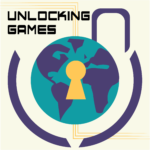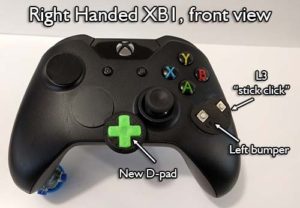
 Ben Heck’s clever customization of an Xbox One controller for one-handed use.[/caption]The word “Accessibility†might bring to mind ramps, braille, and other physical world accommodations. Those are important, but the concepts extends to games and other digital media too.
Ben Heck’s clever customization of an Xbox One controller for one-handed use.[/caption]The word “Accessibility†might bring to mind ramps, braille, and other physical world accommodations. Those are important, but the concepts extends to games and other digital media too.
Sometimes it might even be a practical market share consideration: By some measurements 20% of gamers have a disability, and 8% of all men are colorblind.
Making something more accessible has side benefits too – I know I’m glad to see automatic opening doors when my hands are full.
Often an accessibility standard isn’t only the ethical thing to do, it’s also just good practice. Wouldn’t you like to be able to play your favorite game if you broke an arm or your vision degrades with age?
But what does it mean for a game to be accessible? Games don’t usually have a legal mandate to meet accessibility standards, yet can still benefit from thinking critically about other areas’ standards might be applied.
Looking mostly through the lens of accessible web standards, this episode starts with a discussion of various requirements like the ADA, WCAG 2.0, and Section 508. Then we move into applications of the standards, specifically times we’ve seen accessibility features applied well (PS4’s button mapping options) and less so (Dead Rising’s tiny text).
When have you benefitted from a game being made more accessible? When have you wished developers kept that kind of thing more in mind?
Show Notes & Links:
- National Federation of the Blind vs Target lawsuit
- WCAG 2.0
- DOJ delays adoption of WCAG 2.0 standards to 2018
- Code Cracking: Why is it so Hard to Make a Website for the Government?
- Section 508
- How the Web Became Unreadable
- Colour Contrast Analyser, a free tool for measuring color contrast on websites
- Perkins School for the Blind
- Ben Heck’s custom Xbox One controllers
- Why Game Accessibility Matters
- GameAccessibilityGuidelines.com
- Includification: A Practical Guide to Game Accessibility
- EEG headset supporting mobility impaired gamers with game accessibility, 2014 proceedings of the IEEE International Conference on Systems, Man and Cybernetics.
- Playing Peggle with the MyGaze eye-tracking system
- Higher Ed Accessibility Lawsuits, Complaints, and Settlements
Games mentioned in this episode:
- Dead Rising
- Mortal Kombat
- Call of Duty 4
- The Witcher 3
- No Man’s Sky
- Earthbound
- Tekken
- Dance Dance Revolution
- Pandemic Legacy
- Ticket to Ride